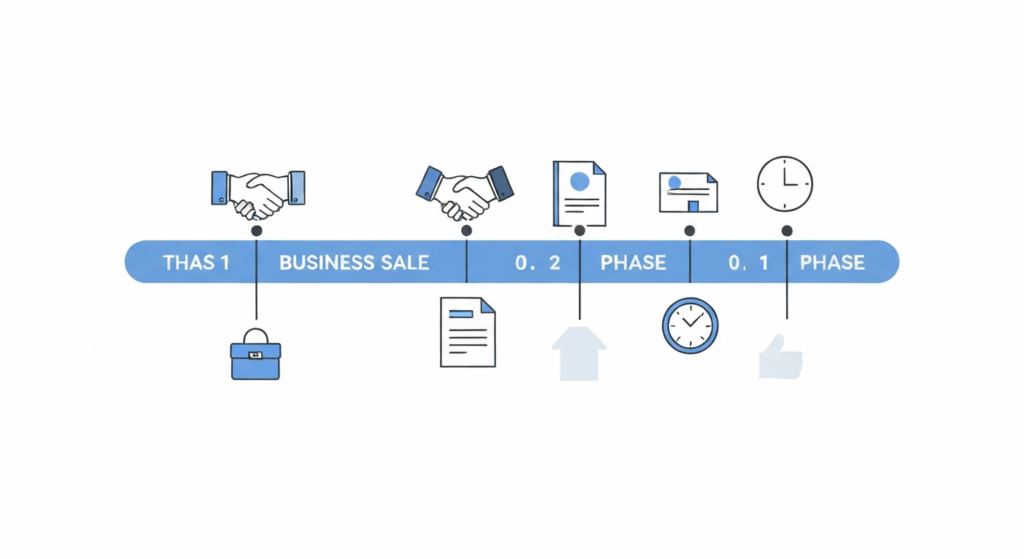How Long Does It Take to Sell a Business? The Complete 2025 Timeline Guide for Business Owners
If you’re a business owner considering selling your company, one of your first questions is likely: “How long will this process take?” The answer isn’t straightforward, as business sale timelines vary significantly based on numerous factors. However, understanding the typical timeframes and what influences them can help you set realistic expectations and plan accordingly.
In 2025, most businesses take between 6 to 12 months to sell from initial preparation to final closing, with the average timeline now reaching approximately 10 months according to recent industry data. This represents an increase from the 6-month average seen in the early 2000s, reflecting today’s more complex business environment and heightened buyer due diligence requirements.
The business sale process involves multiple distinct phases: preparation (3-5 weeks), marketing and buyer identification (3-6 months), negotiations and due diligence (2-4 months), and closing (2-4 weeks). Each phase presents unique challenges and opportunities that can either accelerate or extend your timeline.
Understanding the Business Sale Timeline: What to Expect in 2025
The business selling process has evolved significantly over the past two decades. Today’s buyers are more sophisticated, conducting deeper due diligence and requiring more comprehensive documentation than ever before. This shift has naturally extended the average sale timeline, but it has also resulted in more successful transactions with fewer post-closing disputes.
Current Market Conditions Affecting Sale Timelines
The 2025 business sale market presents unique challenges and opportunities. Economic uncertainty, fluctuating interest rates, and evolving buyer preferences all impact how quickly businesses sell. Recent surveys indicate that nearly half of business owners delayed their sales in 2025 due to election uncertainty and market volatility, creating pent-up demand that may accelerate future transactions.
Key market factors influencing 2025 sale timelines include:
- Financing availability: Higher interest rates have made buyer financing more challenging, potentially extending timelines
- Buyer selectivity: Purchasers are increasingly focused on businesses with strong fundamentals and growth potential
- Technology integration: Companies with modern systems and digital capabilities sell faster
- Supply chain stability: Businesses with diversified, resilient supply chains attract quicker interest
Industry-Specific Timeline Variations
Different industries experience varying sale timelines based on their complexity, regulatory requirements, and market demand. Understanding your industry’s typical patterns can help set appropriate expectations:
Faster-Selling Industries (4-8 months):
- Professional services firms
- E-commerce businesses
- Software and technology companies
- Retail operations with strong locations
Moderate Timeline Industries (8-12 months):
- Healthcare practices
- Construction companies
- Restaurants and hospitality
- Distribution businesses
Longer Timeline Industries (12+ months):
- Manufacturing operations
- Heavy equipment businesses
- Regulated industries (finance, insurance)
- Businesses requiring specialized expertise
The 5 Critical Phases of Selling Your Business
Understanding each phase of the business sale process helps you prepare effectively and identify potential bottlenecks before they occur. Here’s a detailed breakdown of what to expect:
Phase 1: Pre-Sale Preparation (3-8 weeks)
The preparation phase is arguably the most critical for determining your overall timeline. Well-prepared businesses consistently sell faster and for higher prices than those rushed to market.
Key preparation activities include:
- Financial record organization and normalization
- Business valuation and pricing strategy development
- Legal document review and updates
- Operational improvements and documentation
- Management team strengthening
- Marketing materials creation
Many successful business owners begin preparation 12-18 months before their intended sale date. This extended preparation period allows for strategic improvements that can significantly increase business value and reduce time to market.
Phase 2: Marketing and Buyer Identification (6-16 weeks)
Once your business is market-ready, the marketing phase begins. This involves creating compelling marketing materials, identifying potential buyers, and generating qualified interest.
Marketing timeline factors:
- Confidential marketing: Protecting business confidentiality while attracting buyers
- Buyer screening: Qualifying potential purchasers for financial capability and strategic fit
- Initial presentations: Conducting management presentations and facility tours
- NDA execution: Ensuring proper confidentiality agreements are in place
The quality of your marketing materials and the expertise of your business broker or M&A advisor significantly impact this phase’s duration. Professional representation typically reduces marketing time by 30-50% compared to for-sale-by-owner approaches.
Phase 3: Negotiations and Letter of Intent (2-6 weeks)
When serious buyers emerge, the negotiation phase begins. This involves price discussions, deal structure negotiations, and ultimately, executing a Letter of Intent (LOI) or Purchase Agreement.
Negotiation considerations:
- Purchase price and payment terms
- Asset vs. stock sale structure
- Seller financing arrangements
- Employment agreements and non-compete clauses
- Closing conditions and contingencies
Businesses with realistic pricing and flexible deal structures typically navigate this phase more quickly. Sellers who understand various deal structures and remain open to creative financing solutions often achieve faster closings.
Phase 4: Due Diligence (4-12 weeks)
Due diligence represents the most intensive phase of the business sale process. Buyers conduct comprehensive reviews of your business operations, finances, legal standing, and market position.
Due diligence areas include:
- Financial analysis: Detailed review of historical and projected financial performance
- Legal review: Examination of contracts, litigation, intellectual property, and compliance
- Operational assessment: Analysis of systems, processes, and key personnel
- Market evaluation: Competitive analysis and growth opportunity assessment
- Asset verification: Physical inspection and valuation of tangible assets
Well-organized businesses with clean financial records and documented processes typically complete due diligence 40-60% faster than those with incomplete or disorganized information.
Phase 5: Closing and Transition (2-6 weeks)
The final phase involves completing all closing requirements, finalizing financing, and executing the ownership transfer. This phase also includes any agreed-upon transition period where the seller assists with business handover.
Closing activities:
- Final document preparation and review
- Buyer financing completion
- Regulatory approvals (if required)
- Asset transfer and title changes
- Employee notifications and transitions
- Customer and vendor communications
Key Factors That Accelerate or Delay Business Sales
Understanding what speeds up or slows down business sales helps you proactively address potential issues and optimize your timeline.
Factors That Accelerate Sales
1. Exceptional Preparation
Businesses with organized financial records, documented processes, and clean legal standing consistently sell 30-50% faster than unprepared companies. This includes having audited financial statements, updated legal documents, and comprehensive operational manuals.
2. Realistic Pricing
Properly priced businesses generate more buyer interest and move through negotiations more quickly. Professional valuations help establish defensible asking prices that attract serious buyers while maximizing value.
3. Strong Financial Performance
Companies with consistent profitability, growing revenues, and strong cash flow attract buyers faster. Businesses showing 3+ years of positive trends typically sell within 6-8 months.
4. Professional Representation
Working with experienced business brokers or M&A advisors typically reduces sale timelines by 25-40%. These professionals bring buyer networks, marketing expertise, and negotiation skills that accelerate transactions.
5. Management Independence
Businesses that can operate without heavy owner involvement attract more buyers and close faster. Companies with strong management teams and documented systems demonstrate lower risk to purchasers.
Factors That Delay Sales
1. Inadequate Financial Records
Disorganized or incomplete financial documentation is the leading cause of extended sale timelines. Buyers require clear, auditable records to complete due diligence and secure financing.
2. Overpricing
Businesses priced above market value can sit unsold for 12-18 months or longer. Overpricing not only extends timelines but can also damage market perception and reduce final sale prices.
3. Owner Dependency
Companies heavily dependent on owner involvement face longer sale processes as buyers worry about post-sale performance. Key person risk significantly impacts buyer confidence and financing availability.
4. Legal or Compliance Issues
Outstanding litigation, regulatory violations, or unclear intellectual property rights can extend sales by months while issues are resolved. Environmental concerns and zoning problems also create delays.
5. Market Timing
Economic downturns, industry-specific challenges, or seasonal factors can extend sale timelines. Businesses in declining industries or those selling during economic uncertainty face longer marketing periods.
Business Size and Complexity Impact on Timeline
The size and complexity of your business directly correlate with sale timeline length. Understanding these relationships helps set appropriate expectations.
Small Businesses ($500K – $2M Revenue)
Typical Timeline: 4-8 months
Smaller businesses often sell more quickly due to:
- Simpler financial structures
- Less complex due diligence requirements
- More individual buyer interest
- Faster decision-making processes
However, small businesses may face challenges with:
- Limited buyer financing options
- Higher owner dependency
- Less sophisticated systems and processes
Mid-Market Businesses ($2M – $50M Revenue)
Typical Timeline: 8-12 months
Mid-market companies balance complexity with buyer interest:
- More sophisticated buyer pool
- Better access to financing
- More comprehensive due diligence
- Professional management teams
Timeline factors include:
- Regulatory requirements
- Multiple stakeholder approvals
- Complex deal structures
- Extensive due diligence processes
Large Businesses ($50M+ Revenue)
Typical Timeline: 12-24 months
Larger businesses face the longest timelines due to:
- Extensive due diligence requirements
- Regulatory approvals
- Complex financing arrangements
- Multiple buyer constituencies
- Integration planning requirements
Conclusion: Optimizing Your Business Sale Timeline
Selling your business is one of the most significant financial transactions you’ll ever undertake. While the average timeline of 6-12 months may seem lengthy, understanding the factors that influence this timeline empowers you to take control of the process.
The key to a successful, timely business sale lies in thorough preparation, realistic pricing, professional representation, and maintaining flexibility throughout the process. Businesses that invest in proper preparation consistently sell faster and for higher prices than those rushed to market.
Remember that while speed is important, the quality of the transaction matters more. A well-executed sale that takes 10 months is far superior to a rushed transaction that creates post-closing problems or leaves money on the table.
Ready to start your business sale journey? Contact our experienced team today for a confidential consultation about your business sale timeline and strategy. We’ll help you understand your specific situation and develop a customized plan to achieve your exit goals efficiently and profitably.
Get your free business valuation and sale timeline assessment today – because the right preparation makes all the difference in achieving a successful business sale.






